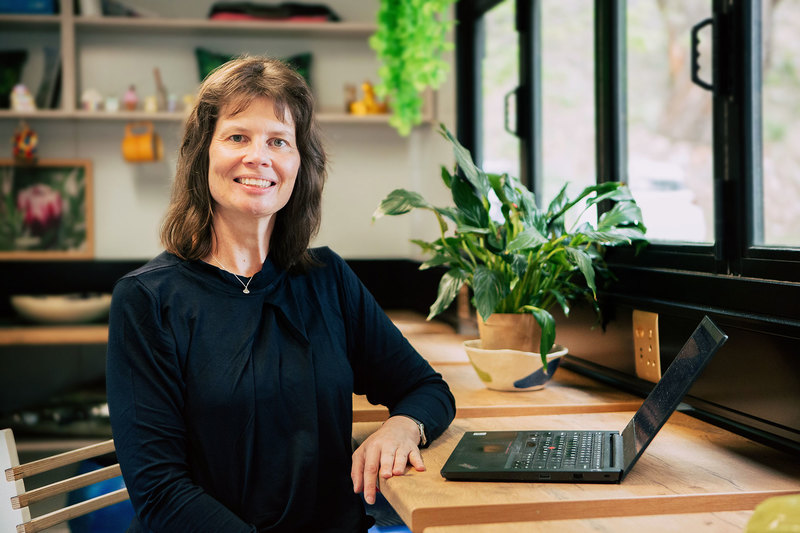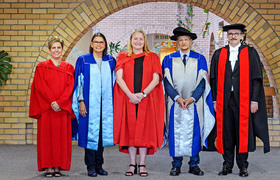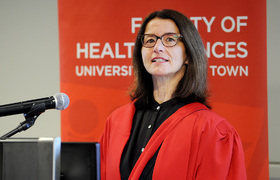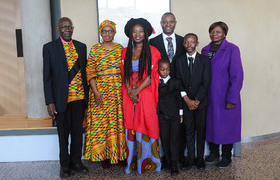A living wage and the dignity afforded by choice
26 October 2023 | Story Helen Swingler. Photo Robyn Walker. Read time 10 min.
On 7 October, workers across the globe marked International Day of Decent Work, a topic the University of Cape Town’s (UCT) Professor Ines Meyer put under the microscope just days later in her inaugural lecture. She began by asking the key question: How can society put human dignity at the heart of jobs and job creation?
A professor of Organisational Psychology in the Faculty of Commerce’s School of Management Studies, Meyer holds the National Research Foundation’s South African Research Chair Initiative’s chair in Creation of Decent Work and Sustainable Livelihood. Her 12 October inaugural lecture is part of the UCT Inaugural Lecture Series of 2023.
Titled “Work-for-pay – for what? A Call for Human Dignity to Take Centre Stage in the Employment Debate”, Meyer said that economic needs should not supersede what humans need in terms of decent work. This is underscored in the United Nations’ 17 Sustainable Development Goals, which put people at the centre of decent work – and drive sustainable development.
Work, income and prosperity
As a preface to her lecture, Meyer asked her audience to consider three deceptively simple questions: What is work? Why do we work? What is the main reason we work?
“The links between work, income and inclusive prosperity deserve at least a nuanced approach.”
“The links between work, income and inclusive prosperity deserve at least a nuanced approach,” she said. This is what her research targets: developing innovative ways to see work, its purpose and role, and how these affect employers and employees.
The economic considerations that have driven the conversations about jobs and wages constitute only one facet of the topic, she said. But it’s not enough.
“Since the 1990s, economic growth has been the chosen path to inclusive prosperity in South Africa, and greater participation in the labour market is seen as key to socioeconomic upliftment,” she said. “Implicitly, what seems to count primarily is that employment is created, not what this employment looks like.”
But this strategy has shown limited success. Poverty in South Africa increased between 2011 and 2016, directly affecting over half the population.
“And it is not restricted to the unemployed,” said Meyer. “Low-income earners also get trapped in poverty when they rely on loans to cover basic needs or unexpected expenses.”
The root of dignity
Instead, decent work is characterised by respect for human dignity, provides an adequate livelihood and supports individuals and their families to fully develop their capacities and talents – the freedom to makes choices about their lives.
“This is the root of dignity and the core to this approach is how we value individuals.”
In South Africa, people were stripped of their dignity for centuries and Meyer attributes many of the social ills the country faces to the fact that many of today’s practices and systems continue doing so.
“It is quite simple, really: We take another person’s dignity if we do not truly ‘see’ them. Seeing one another is the root of dignity,” said Meyer.
“And when it comes to organisations and employment, it is easy not to see ‘the other’ because they become a staff number on a spreadsheet, far removed from the individuals with their own experiences. When we pay a person too little to have choice in life, we communicate that we do not see them, that we do not value them as human beings, and thus we do not afford them dignity.”
One line of Meyer’s research thus concerns how much individuals should be paid, at least as a minimum, to live dignified lives. In Africa, one-third of those who work are extremely poor and half of the working population is not able to live on the money they earn.
Economic equations not enough
“The solution to the challenge of extreme poverty is economic growth so that we can create more jobs,” said Meyer. “Given the large percentage of unemployed individuals in South Africa, it is unlikely that many of those will ever be able to find jobs. How are those individuals going to be able to sustain their lives?”
Instead of focusing on job creation at all costs, Meyer said attention should shift to creating quality jobs.
“A job which pays too little for individuals to live a decent life is likely worse than no job at all. We need to pay living wages.”
“A job which pays too little for individuals to live a decent life is likely worse than no job at all. We need to pay living wages.”
The idea of a living wage dates to 1919 when it was mentioned in the Treaty of Versailles following the First World War. In 1948, the United Nations Universal Declaration of Human Rights mooted that everyone who works has the right to just and favourable remuneration.
“It is thus not just a nice-to-have, but a human right [that ensures] an existence worthy of human dignity,” Meyer added.
Various definitions have been used to determine what a living wage constitutes, but generally it is earning enough money to enable people to have a humble life that affords the basic needs – and some savings.
People development approach
Today economists at universities calculate a living wage is by looking at how much it costs to provide essentials such as good nutrition and healthcare.
“We opted to ask people directly, concentrating on what money allows people to do, rather than how much they earn.”
“As psychologists, we found it strange that people living middle-class lives in ivory towers are deciding on what people, who have less, need to live a decent life. That’s paternalistic and condescending. As psychologists, we opted to ask people directly, concentrating on what money allows people to do, rather than how much they earn.
“Money only becomes important because of what it enables people to do in the areas of life that matter to them: the kind of housing they have, where they live, where they send their children to school. That will give people dignity. Dignity is very important and comes into everything we do and how we do this research.”
Using a people development approach, Meyer and her team have mapped these variables to determine a living wage. The y-axis (vertical) and x-axis (horizontal) are quality of life and quality of work respectively.
Meyer hypothesises that the point at which these meet represents the monthly income individuals need to have choice over their lives – and the quality of their lives. The mean is around R10 000 a month. At around R15 000 the curve levels off.
This work doesn’t make assumptions about people, said Meyer. Instead, it centres on developmental economist Amartya Sen’s ‘capability’ approach, which proposes that prosperity depends on individuals’ capabilities to achieve the kind of lives they reasonably value.
Meyer and her team are now working on a data collection project that underpins an initiative to measure this facet, and how much choice people have over areas of life that matter to them. They started in 2015 with small samples in Cape Town and in 2019 enlarged the sample. Last year they established a national sample. Data collection is about to begin in all nine provinces.
Advocacy work built into research
Dignity is the leitmotif of their data research collection methods too.
“Our core principle is that the topic is not more important than the way we go about it. As such, the data collectors we are training for this study are UCT students. During vacations they return to homes all over the country and we help them to understand what this project is all about and why the living wage is important. So, we build advocacy work into training data collectors.”
Once the data has been collected, debriefing sessions will open a forum for student data collectors to share their experiences.
“Many had no idea how little people earn and we believe this will shape them as future leaders who will become decision makers in organisations.”
Meyer has extended the reach of this work, founding the Living Wage South Africa Network, an open network for different stakeholders interested in the living wage concept in South Africa. Everyone interested in the living wage is welcome to join.
Last year the network published a position paper outlining the argument for a living wage why and dignity should be part of any business argument and approach.
“This year the organisation was registered as an NPO [non-profit organisation], which was important as we now have an entity.”
On the research side is Project Glow, which harnesses researchers across 30 countries who are interested in this methodology in determining living wages.
Where to from here?
Meyer and her team are developing a minimum wage benchmark and making their data available to employers through the Living Wage South Africa Network.
“We want to advocate that this way of determining a living wage should be adopted widely.”
 This work is licensed under a Creative Commons Attribution-NoDerivatives 4.0 International License.
This work is licensed under a Creative Commons Attribution-NoDerivatives 4.0 International License.
Please view the republishing articles page for more information.










